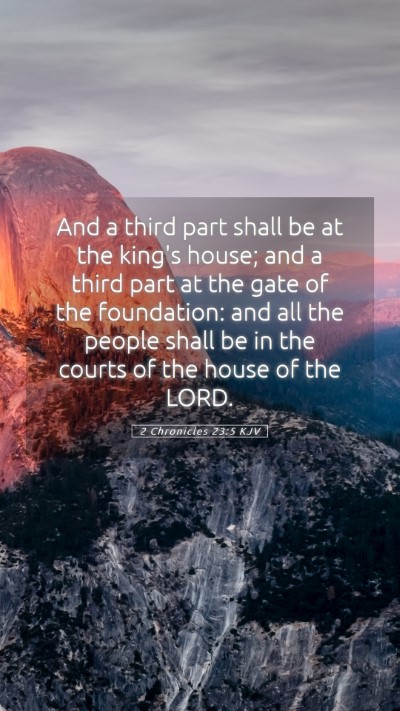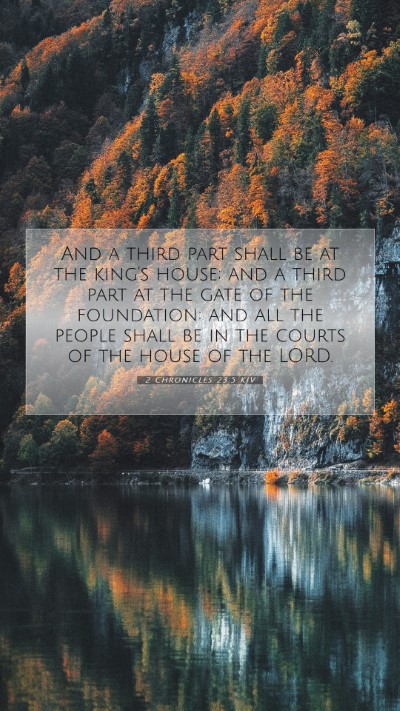Understanding 2 Chronicles 23:5 - A Comprehensive Bible Verse Commentary
This commentary provides an in-depth exploration of 2 Chronicles 23:5, incorporating insights from esteemed public domain commentaries including those by Matthew Henry, Albert Barnes, and Adam Clarke. The purpose is to enhance the reader's understanding of Bible verse meanings, interpretations, and explanations in a structured format.
Verse Context
2 Chronicles 23:5 states:
"And he commanded them, saying, 'This is the thing that ye shall do; A third part of you that enter in on the sabbath shall be of the priests and of the Levites, which keep the watch of the house;'"
This verse comes in the larger narrative of the ascension of Joash to the throne of Judah and the reformative measures surrounding his rule.
Insights and Interpretations
Historical Significance
In the context of Israel's history, this passage emphasizes the organization of the temple service and the protective measures taken to safeguard the king during a critical political moment. These actions were crucial for establishing a new order in response to Athaliah's tyranny.
Matthew Henry's Commentary
Henry highlights the importance of order and duty within the temple service. He notes that Joash, though still a boy, shows wisdom beyond his years by involving the Levites in the preservation of the Lord's house and in the governance of the temple services. This signifies a restoration of proper worship and reverence for God.
Albert Barnes' Insight
Barnes elaborates on the division of the priests and Levites into groups, illustrating the necessity of structured worship and vigilance in the service of God. His analysis points out that organizing the guards and the way they were to take turns illustrates God's desire for order in worship, which is a principle that extends to all facets of worship and community life.
Adam Clarke's Exegesis
Clarke emphasizes the necessity of Temple guards during this tumultuous time. He explains that the leadership of Joash marked a pivotal point in Judah's history, calling for a recommitment to God’s covenant. The regulation of the priesthood and the Levites was imperative to restarting the worship and maintaining divine favor.
Application of the Verse
This verse points to the importance of structured worship and God-centered governance. It serves as a lesson on the significance of fulfilling one's duties and maintaining order in the house of worship. For modern readers, this verse can be applied in the context of ensuring that the church remains a place of reverence and integrity.
Bible Study Insights
- Importance of Organized Worship: This verse highlights the need for a systematic approach to worship, urging current believers to consider how they can contribute to maintaining order within their faith communities.
- Leadership and Responsibility: Joash's actions promote the idea of leadership as not just a position, but a responsibility to protect, serve, and restore faith.
- Historical Context: Understanding the circumstances leading to this verse's message enriches comprehension. It's vital to recognize the opposition faced by Joash, recalling the divine intervention that enabled his reign, encouraging believers to trust in God's plans amidst adversity.
Related Bible Verses
To further explore the themes and messages present in 2 Chronicles 23:5, consider these cross-references:
- 2 Kings 11:4 - The anointing of Joash and his protection.
- Exodus 35:30-33 - God appointing craftsmen for the building of the tabernacle.
- Numbers 3:6-10 - The duties assigned to the Levites and priests.
- 2 Chronicles 20:20 - The importance of faith in action during King Jehoshaphat's reign.
- 1 Chronicles 26:1-19 - The organization of gatekeepers and their roles in the temple.
Conclusion
2 Chronicles 23:5 provides a profound lesson in the importance of order, leadership, and worship. Through the combined insights of historical context and the teachings of various commentaries, readers gain a clearer understanding of this scripture's significance. This analysis aids in enriching one's Bible study experience, allowing for deeper insights into the intended meanings found within the scriptures.


